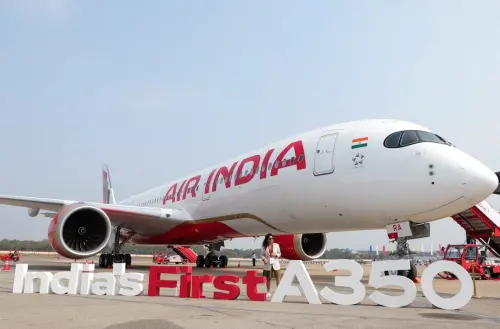Air India is pursuing a fresh multi-billion dollar order for dozens of widebody jets from Boeing and Airbus, as the airline continues its transformation under new owner Tata Group. Discussions involve 30 to 40 aircraft, split between the Airbus A350 and Boeing 777X models, with indications that the deal could surpass 50 jets. However, details have yet to be finalized.
Clarity on the potential order is expected to emerge closer to the Paris Air Show in June. Air India has not responded to requests for comment, and both Boeing and Airbus have declined to provide any statements.
This planned expansion adds to a previous order in 2023 for 470 planes from both manufacturers, primarily consisting of single-aisle aircraft. The new widebody contract could significantly enhance Air India's modernization efforts to regain market share lost to international competitors.
Currently, the airline has orders for 50 Airbus A350s, 10 Boeing 777Xs, and 20 787 Dreamliners from earlier agreements.
The potential order comes as international passenger traffic from India is experiencing a surge, projected to increase by 15-20% in the current fiscal year ending March 31, significantly outpacing domestic travel growth of 7-10%, according to ICRA, a local ratings agency.
Airlines are also racing for limited production slots for widebody jets, following a strong demand for smaller narrowbody aircraft from rapidly expanding airlines like IndiGo, India's largest carrier.
Air India's transformation under Tata is being closely monitored by investors, manufacturers, and lessors, particularly after years of decline under state ownership, though progress is currently hindered by aircraft delivery delays.
Once regarded as a premier airline, Air India's reputation has suffered since the mid-2000s due to financial difficulties, an aging fleet, and subpar service.
CEO Campbell Wilson noted earlier this week that global aircraft shortages are anticipated to last for at least four years, with ongoing pressures on supplies of engines, first- and business-class seats, and certain fuselage components contributing to delays.
These challenges have compelled the airline to continue operating some older aircraft as Tata implements its five-year transformation plan for Air India. Concurrently, the airline is striving to recover market share from international competitors like Emirates, Lufthansa, and Turkish Airlines, which historically have attracted Indian travelers with their newer fleets and premium offerings.
Indian carriers currently account for 43-44% of outbound passenger traffic from India, while international airlines remain dominant. Air India and its low-cost subsidiary Air India Express are expected to take delivery of about 20 narrow and widebody aircraft this year, according to UK consultancy Cirium Ascend.
